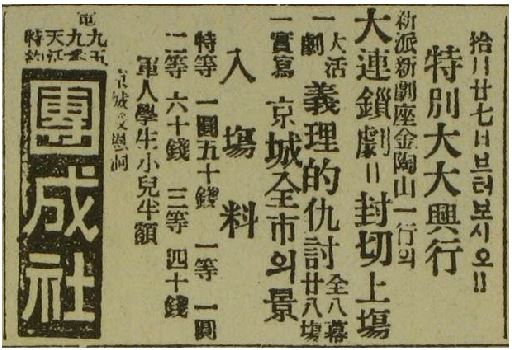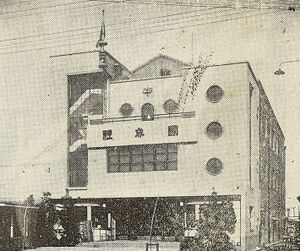Righteous Revenge (lost Korean kino-drama film; 1919)
Righteous Revenge (Korean: "의리적 구토"/"의리적 구투") was a 1919 Korean stageplay-film hybrid directed by Kim Do-san (1891-1921) and produced by Park Seong-pil premiered on October 27, 1919 at the Dansungsa theater in Keijō, Japanese Korea (now Seoul, South Korea).[1] Despite being considered the first film ever to be produced in Korea,[2] what makes it different to other films is that it was accompanied with a stageplay (also known as a kino-drama).
Summary
No much is known about the plot, what is known is that the kino-drama centers around a character whose goal is to defend his father's inheritance from other family members and his stepmom.[3] The story was also considered as a symbolism for the Korean independence movement during the time Korea was part of the Japanese Empire.[4]
Availability
Despite the film being a success, with 100,000 tickets sold,[5] the film has no surviving footage and its script is lost.[6]
Legacy
Righteous Revenge has led to the Korean Film Day celebrated on October 27, which coincides with the kino-drama's release date in 1919,[7] the goverment of South Korea also considers the kino-drama to be the first film of Korea's history.[8]
External Links
References
- ↑ The Korea Times - Centennial of Korean cinema - From humble beginnings to mega hits
- ↑ The Korea Times - Korean cinema celebrates 100th year anniversary
- ↑ The Korea Times - 'Righteous Revenge' marks birth of Korean cinema
- ↑ 문화뉴스 - 연극으로 만나는 한국 최초 영화 '의리적 구토' (in Korean)
- ↑ The Korea Times - 'Righteous Revenge' marks birth of Korean cinema
- ↑ arsenal-berlin.de - "Spring on the Korean Peninsula: Korean Cinema 1934–1962"
- ↑ 문화뉴스 - 연극으로 만나는 한국 최초 영화 '의리적 구토' (in Korean)
- ↑ Yonhap News Agency - S. Korean movie industry to celebrate centennial in Oc

